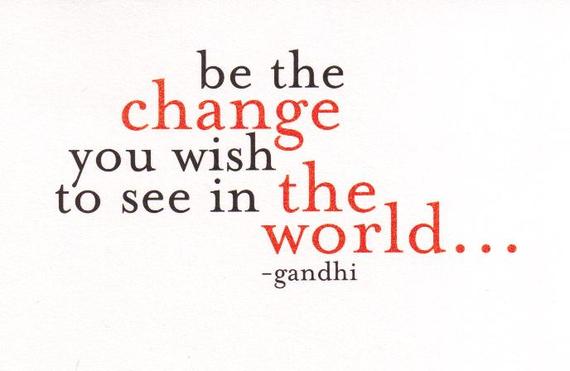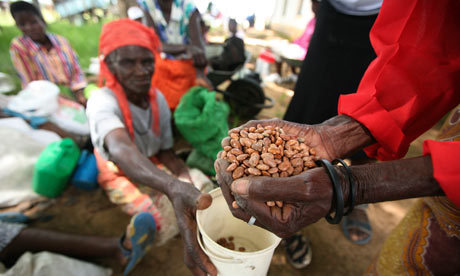In 2012, after quitting my corporate job on first day, I was idealistic and determined to change the world. So much so, I decided to start with Africa. This is probably the most clichéd beginning for a story of many young Millennial "change-makers."
Here I was, a guy from India, studied in USA, now in a war torn Portuguese-speaking Africa country -- Mozambique. With a Masters degree on one hand that got me the job, which I quit, and quixotic aspirations on the other to change the world. My ego and understanding were shattered when I saw how little the community has got from the traditional donation and charity that claim to change the world or even from hundreds of volunteers who come every year, click pictures, write a blog and yes make a change. These days even the ephemeral messaging app creators claim to change the world by changing the way we communicate. Yeah right!
Here is a template pitch for start-ups changing the world. This includes app that have animated cats giving your daily horoscope to non-profits that want to give laptops to children in Africa who may not access to stable power supply or electricity in their house.
"We have created a new way for you to __________. With this we will not change the way you _______ but change the world."
While I was working in Mozambique alongside students from universities and doctors and nurses in the hospital, I realized I learnt so much more about frugal innovation from them then I learnt in my grad school. Who are we fooling, when we say that I am going to Africa this summer to give back to the society? You are probably going to receive more than you give back. And even if you didn't show up on time to volunteer, the change is happening. Because it is inevitable as we know about change.
There is no single hegemonic model for changing the world. You can give a bag full of rice or you can use your technology skills to create a tool for farmers that can educate them to grow their crops locally. Or you worst you can just be a debater on these topics and not actually do anything on the ground.
To further exercise your brain on why one model of change maybe better than the other one.
"Certain types of food "aid" (when not for emergency relief) can actually be destructive. Dumping food on to poorer nations (i.e. free, subsidized, or cheap food, below market prices) undercuts local farmers, who cannot compete and are driven out of jobs and into poverty, further slanting the market share of the larger producers such as those from the US and Europe." Read the Article on "Food Aid as Dumping" here.
The United States exported over sixty million tons of grain in 1974. Only 3.3 million tons were for aid, and most of that did not reach the starving. For example, during the mid-1980s, 84 percent of U.S. agricultural exports to Latin America were given to the local governments to sell to the people. This undersold local producers, destroyed their markets, and reduced their production. -- J.W. Smith, The World's Wasted Wealth 2, (Institute for Economic Democracy, 1994), pp. 66-67.
Nothing is wrong here and everything is right, as long as the intentions are good, is what we think. So what if one fine year, a multi-national bank files bankruptcy and then it affects the flow of international AID and people in my community back home in India or Africa are waiting for that bag of rice supply. It's really okay, because you are a change maker. [Insert straight face smiley here]
Africa is going to move (actually, it has already moved) using Internet on their cell phones by skipping an entire generation of using Internet on the computers first. And using text messaging to pay for their groceries and utility bills since last couple of years while we rejoice on the new Apple mobile payment system launched in 2014, to change the way you shop for things that you may not need.
The "changing-the-world" phrase is tantamount to every new thing out there today. I am not an expert on this topic or anything, how can anyone be, if you think about it. Everything is changing every second. And it's not because of tiny computers on our wrist and in our pockets, well not just that. It's because how the world works. For the sake of argument, we live in the space-time continuum, which changes every second. The concept and dimension of time means change. What is changing and how and when is what we are really driving and not the change itself.
I was recently tagged as a change-maker in a conversation with five other change makers. When I was asked about my work at Ycenter and what am I doing different that no other service organization in Africa is doing. I felt like this is a trap question. At the end of this, you can come out as ignorant or presumptuous, especially when you are 26 year old and you do not have a Ph.D. in international economics or policies or something like that. I used to answer this question by stating the facts on how traditional donation and charity has not created the impact in last two decades, as it should have, despite the right intentions.
How there is poor accountability with many non-profits. With Ycenter, we focus on technology projects in community, through their permission and participation. We do not want to send insecticide treated mosquito nets only, instead leverage technology to fight Malaria from its roots. Are we changing the world? Well that's the plan. But is that what we are doing? I don't know. We want to start shifting the conversations about Africa from donations to creating entrepreneurial ventures and tech start-ups across the continent. So what I know and my answer now is that we are changing the way we change the world.
Go to an event full of Millennials. The majority claims that I don't want to take up a job or maybe I want to quit my job. I want to start an NGO and change the world for ________. Well that's good. In fact, way better than suiting up to sell sugar water. But how about getting inside the government and changing the world -- through policies, governance and systemic issues? Yes it comes with the risk that it will change you more than you may change the world. But that's going to happen anywhere else as well, remember - it's inevitable! Some city governments are now opening up civic data and inviting young entrepreneurs and ethical hackers to help government drive the change. Join them for starters!


